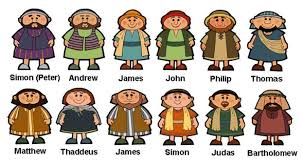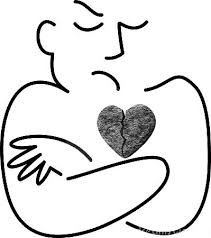Zechariah 7:4-5 – Then the word of the Lord of hosts came to me: "Say to all the people of the land and to the priests, 'When you fasted and mourned in the fifth month and in the seventh, for these seventy years, was it for me that you fasted?'"
In our last post we discovered that the Jewish citizens of Bethel sent a committee of important men to the priests and prophets (Haggai and Zechariah) of Jerusalem. Their purpose was to 'inquire' of the Lord.

Specifically, the men of Bethel wanted to know if they should continue to observe a yearly fast held on the 10th day of the fifth month. That date was set aside for fasting and mourning because it was the day Solomon's temple had been destroyed by the Babylonians.
We know the men were sincere in their inquiry, so there was no doubt that God would honor their request with an answer. Sure enough, he soon speaks a word to Zechariah.
In order to fully understand God's reply, we first need to review what we know about the Day of Atonement.
The Day of Atonement was the day that the high priest went into the Holy of Holies and made atonement for the sins of the nation of Israel for the year. It is also the only day of fasting and mourning that God commanded the children of Israel to observe. In addition, the Israelites were to do no work on that day.
You can read all the details of the Day of Atonement in Leviticus chapter 16, but here are the basics:
- The process of yearly atonement began with the high priest bathing and dressing himself in white linen garments (not his regular high priestly robes). The white color symbolized the holiness required for admission into God's presence (Hebrews 12:14).
- The next step was to gather the necessary sacrifices. The high priest selected a bullock for a sin offering and a ram for a burnt offering, which would be offered for his own sin and the sins of the other priests. He also selected two male goats and a ram which were offerings for the rest of the people. The two goats were presented before the Lord at the door of the tabernacle, where lots were cast upon them. One goat became the Lord's while the other became the scapegoat.
- Now the high priest was ready to complete the first stage of atonement, which was for himself and everyone in the priesthood. After the bullock (sin offering) was sacrificed, the high priest took a censor filled with live coals from the altar of burnt offering along with a handful of incense and entered the most holy place (the location of the Ark of the Covenant and the mercy seat).
- The high priest cast the incense upon the coals, creating a cloud which prevented him from viewing the mercy seat and the cherubim which guarded it. He then left the most holy place to pick up a basin filled with the blood of the bull. He immediately reentered the most holy place and sprinkled the blood on the mercy seat (once) and on the ground before the ark (seven times). This completed the first stage of atonement.
- In the second stage, atonement was made for the temple itself and for the people. The goat which had been selected by lot as being 'for Jehovah' was slain by the high priest, who then entered the most holy place for a third time with its blood, which he sprinkled as before – once on the mercy seat and seven times on the ground before the ark. He then proceeded to 'cleanse' the altar of burnt offering, which stood in the outer court.

- In the third stage of atonement, the high priest would place both of his hands upon the head of the remaining goat (the scapegoat) and make a solemn confession of the sins of the entire nation. By this ceremony, the sins of the people were symbolically and literally transferred to the head of the goat. The goat was then released into the wilderness.
- At the end of all this, the high priest would enter the temple, remove the special linen garments, bathe again and change into his normal high priestly garments. At that time, he would return to the outer court and offering burnt offerings for himself and the people, together with the fat of the sin offering. It literally took all day to complete these tasks.
As we read and study the Day of Atonement, the awful reality of sin becomes apparent. Sin infected and contaminated not only the common people, but the priests and the sanctuary itself. Sin was such a heinous problem that it required cleansing by blood and propitiation.
At that time, the required innocent blood came in the form of an animal. The propitiation (the act of appeasing the wrath and securing the favor of an offended person – in this case God) was to be done by each individual Israelite.
So we find that in a single day each year, God provided all that was needed for the atonement of Israel:
- He mandated the correct blood sacrifices (blood being the universal medium of purification and atonement).
- He commanded the people to cease from labor that day (giving them time to consider their spiritual state, and grieve for their sins).
- He ordered a complete abstinence from food (an outward sign of inward penitence).
Let me just stress again that although the high priest was responsible for the actions associated with the atonement, each individual person was responsible for considering their own life, mourning over their own sin, and participating in their own heart-felt repentance.

It was this inward repentance that God was seeking. Simply going through the motions of abstaining from work and food without true repentance was empty and useless. In fact, it was an insult to God.
With this background in mind, let's take a closer look at the inquiry of the men of Bethel.
The first thing we notice is that God's answer was not just addressed to the men of Bethel, but to all the people of the land as well as the priesthood. In other words, God was addressing all of the Jews.
The second thing we notice is that God begins by answering their question with a question of his own. By doing so, God prompts the Jews to stop and examine something in their own lives.
God acknowledges that the men did, in fact, fast in the fifth (and seventh) months every year since the captivity, just as they claimed. But the real question was this: What was the motivation behind the fast?
Was it to honor and glorify the Lord? Was it to truly mourn over the sins of the nation which caused the destruction of the temple and the captivity? Or were these human-appointed fasts done for private motives or sentimental reasons? Should God be pleased with a fast that he did not sanction, for reasons that did not glorify him?
Zechariah 7:6 – "And when you eat and when you drink, do you not eat for yourselves and drink for yourselves?"

God goes on to question their motives in everyday life when they partake of food and drink at will. In those instances, is there a motivation to please and glorify God? Are they thankful for what God has provided for them? Do they care about the needs of others?
God makes it very clear that regardless of whether the Jews chose to fast or feast, they were doing it to please themselves. Neither scenario was designed to bring honor and glory to God. Because that was the case, God had no interest in whether they fasted or not!
As for us, we are told to honor God in both our days of mourning/fasting and in our days of freely eating/drinking:
1 Corinthians 10:31 - Whether therefore you eat, or drink, or whatsoever you do, do all to the glory of God.
This leads us to conclude that we can honor God by fasting and we can honor him in feasting. The key is that we need to be doing what pleases and honors him, not ourselves.
Zechariah 7:7 – "Were not these the words that the Lord proclaimed by the former prophets, when Jerusalem was inhabited and prosperous, with her cities around her, and the South and the lowland were inhabited?"
The Lord directs the current generation of Jews to reconsider the instruction and commands he had already given them, back when their ancestors were dwelling in the Promised Land, enjoying all of his blessings.
During that time, God had repeatedly exhorted the Jews to seek godly repentance. He made it very clear that true religion did not consist of mere outward actions like fasting or ceasing from labor; God was concerned with the attitudes and conditions of their hearts.
1 Samuel 16:7 - But the LORD said unto Samuel, Look not on his countenance, or on the height of his stature; because I have refused him: for the LORD sees not as man sees; for man looks on the outward appearance, but the LORD looks on the heart.

(See also Genesis 6:5, Deuteronomy 6:4-6, Deuteronomy 8:5, Joshua 22:5, Joshua 24:23, etc). In order to be righteous before God, the outward actions of the Jews had to reflect their inward thoughts and the motivations of their hearts – but in the matter of their human appointed fasts, they did not match up.
Therefore, the Jews were doubly wicked – they acted as though they were very anxious not to offend God (in canceling the fast), but this was a false pretence because they were never concerned with pleasing him by their fast in the first place!
The truth is that if the Jews were truly seeking to please and honor the Lord, it would have shown up in the actions of their everyday lives. We know this because whatever is in the heart of a person manifests in his or her actions.
Matthew 7:16 - You shall know them by their fruits. Do men gather grapes of thorns, or figs of thistles?
This is easy to understand, if we will do exactly what the Lord instructed the Jews of Zechariah's day to do – consider the words/instruction that God had already given the Jews through his law and prophets.
For instance, in Isaiah 58:1-3, the Jews who lived before the captivity asked God why he did not see or honor their fasts. God replied that while they were abstaining from food, they were seeking their own pleasures, oppressing their workers and participating in constant fighting and quarreling. God was very adamant that he would not honor such a fast:
Isaiah 58:4 - Fasting like yours this day will not make your voice to be heard on high.
God then goes on to tell the Jews that the 'fast' which pleases him is when they seek to exhibit love, mercy and justice in their everyday lives.
Isaiah 58:6-7 – Is not this the fast that I choose: to loose the bonds of wickedness, to undo the straps of the yolk, to let the oppressed go free, and to break every yoke? Is it not to share your bread with the hungry and bring the homeless poor into your house; when you see the naked, to cover him, and not to hide yourself from your own flesh?
These actions of mercy, justice and love are the result of an inward motivation – loving the Lord your God with all of your heart, soul, mind and strength and loving your neighbor as yourself. If the Jews had followed these simple, straight-forward commands of God, they would have avoided the captivity all together and there would be no reason for the current generation to fast in the fifth month.
The lesson God was teaching was this: The Jews anxiously inquired about their fasts, but instead they should have been diligently heeding the lessons taught by the prophets and verified through the captivity – obedience is better than the sacrifice of vain fasting (I Samuel 15:22).
This is a lesson that we too must learn and heed. God has not changed (Malachi 3:8). He expects the believers of our generation to love him with all of our heart, soul, mind and strength and to love our neighbors as ourselves (Mark 12:29-31). He expects righteousness to manifest itself in the actions and decisions we make every day of our lives. We too are to show love, mercy and justice to our fellow man.
Zechariah 7:8-9 – And the word of the Lord came to Zechariah saying, "Thus says the Lord of hosts, Render true judgments, show kindness and mercy to one another."
The Lord now goes on to reiterate some of the specific commands he had already given his people through the earlier prophets.
The first among these is a mandate to judge justly. Because the average person was not in a position to judge, this command was specifically aimed at the elders and judges of the nation.
Since they are reminded/commanded to decide cases in a fair and equitable manner according to the law, we can assume that they were doing the opposite – taking bribes, rendering judgments that would benefit themselves, or making favorable decisions for friends and family.
Next, the Lord addresses all of the Jews. In addition to not lying, harming, defrauding or cheating each other, they are to go one step further by showing kindness and mercy to one another, on a daily basis. Again, this is not a new command:
Micah 6:8 - He has showed you, O man, what is good; and what does the LORD require of you, but to do justly, and to love mercy, and to walk humbly with your God?
In other words, they were to minister to those who needed food, clothing and shelter in addition to assisting anyone who was in distress physically, mentally or emotionally.
These are the things God required of his people, and to fulfill these commands was more acceptable to God than any amount of sacrifices or fasts.
Zechariah 7:10 – Do not oppress the widow, the fatherless, the sojourner or the poor and let none of you devise evil against another in your heart."
Having reminded the Jews to practice positive acts of love, he now forbids any actions that are harmful to others. Widows, orphans and foreigners are specifically mentioned because they are the most likely people to suffer oppression (because they have no one to help them), but the command applies to every single person in the nation.
 So we find that the word of the Lord to Zechariah was the exact same word that he presented to the Jews through the law and numerous prophets (Jeremiah 7:5-7, Leviticus 19:18, Deuteronomy 10:17-19, Isaiah 1:16-17, etc).
So we find that the word of the Lord to Zechariah was the exact same word that he presented to the Jews through the law and numerous prophets (Jeremiah 7:5-7, Leviticus 19:18, Deuteronomy 10:17-19, Isaiah 1:16-17, etc).
The point being made here is that love and respect for God is not demonstrated through mere robotic observation of religious rituals (like fasting in the fifth month). Love for God first takes root within our hearts and minds. Then, because of what we have inside, our outward actions toward our fellow man will automatically reflect our love for God. This treatment of others is what honors and pleases the Lord (Matthew 22:37-40).
Zechariah 7:11 – But they refused to pay attention and turned a stubborn shoulder and stopped their ears that they might not hear.
The Lord now begins to give a history lesson to the current generation of Jews. 'They' refers to their forefathers, the generations who lived before the 70-year captivity.

God describes them as people who 'turned a stubborn shoulder'. What does that mean?
To shoulder something means to take on a burden or a responsibility. To shoulder a responsibility is to willingly step up and commit to serving in a certain capacity.
God had made a covenant with the Jews. He blessed them and watched over them. In return he expected them to serve him, to live by his laws and to be a witness for him in front of the heathen nations. But instead of shouldering that responsibility and submitting to God's yoke, they 'turned a stubborn shoulder'.
In other words, the prior generations had been fully warned and instructed in the commands of God. They were aware of the blessings for obedience and the curses for rebellion. But for some reason, they chose to shake off their fear/respect for the Lord and they refused to submit to his authority, even though God's yoke is easy and his burden is light (Matthew 11:30).
Even at that point God did not give up on his people. He sent them prophet after prophet and gave them warning after warning to turn from their wicked ways. But they refused to hear what the Lord was saying to them through the law and the prophets.
The Jews acted wickedly, obstinately refusing to obey God, despite the fact that his teaching was clear and easy to understand.
As a result, those who refused to bear the light and joyful burden of the Lord were instead forced to bear the heaviest and most depressing weight possible – that of their own sin.
Zechariah 7:12 – They made their hearts diamond-hard lest they should hear the law and the words that the Lord of hosts had sent by his Spirit through the former prophets. Therefore, great anger came from the Lord of hosts.
In just a few short verses, God more or less sums up the entire history of the Jewish people.
One - They refused to hear (or chose to ignore) the words/commands of the Lord which were fully explained and clearly revealed to them.

Two – They chose to rebel against God, turning a stubborn shoulder to him. God responded by using promises, threats and even minor chastisement to bring them back into the yoke of obedience/submission.
Three – The Jews spiritually 'dug in their heels' so to speak. In other words, they hardened their hearts against the voice of the Lord, as revealed through his word and his messengers. They became unyielding and stubbornly wicked, refusing to repent and follow the commands of God, making their hearts as hard as diamonds. Yet, at the same time, they continued participating in vain religious observances.
Jeremiah 17:1 - The sin of Judah is written with a pen of iron, and with the point of a diamond: it is engraved upon the tablet of their heart, and upon the horns of your altars;
Four – Their obduracy (active resistance of the heart and will against the pleading/calling of God) and stubbornness resulted in a hardening or deadening of their sensibilities; it eventually resulted in a calloused or seared conscience (I Timothy 4:1-2).
The end result of this kind of behavior is that the Jews suffered the wrath/anger of the Lord. This was not (or should not have been) a surprise to them. When God entered into a covenant with Israel, he was very clear about the blessings for the nation that obeyed and the curses that were in store for those who rebelled. Because God is always faithful to his promises, Israel was judged and sent into captivity.
Zechariah 7:13 – "As I called, and they would not hear, so they called, and I would not hear," says the Lord of hosts,
This is a very, very sobering verse. When dealing with mankind, God's first choice is always mercy. He always sends us a warning about our sin and he allows a time for us to repent. His desire is for us to be reconciled to him, and for us to remain on the paths of obedience and righteousness where he can bless us.
However, if we refuse his mercy and persist in rebellion, God has every right to be angry and offended with us. He has every right to stop listening to those who refuse to listen to him.
The substance of this verse is that the people of God reaped exactly what they had planted – Holy Spirit called, warned, entreated and urged the Jews to repent of their sin so they could live, but they refused. So when the day of calamity came and they cried to God by fasting, praying and mourning during their distress, he refused to listen to their cries:
Micah 3:4 - Then shall they cry unto the LORD, but he will not hear them: he will even hide his face from them at that time, as they have behaved themselves in an evil way in their deeds.
God promises the same thing in Isaiah 1:15, Proverbs 1:27-29, Hosea 5:6, Jeremiah 11:14 and Jeremiah 14:12.
As the Jews knew all too well, continuing down the path of evil will always result in heartache, destruction or worse.
Zechariah 7:14 - and I scattered them with a whirlwind among all the nations that they had not known. Thus the land they left was desolate, so that no one went to and fro, and the pleasant land was made desolate."
Because the Jews living in the Promised Land refused to be faithful to the Lord and show mercy to their fellow man, they eventually came to the place of judgment/chastisement; they were cast out of the land and sent into captivity.

This verse (verse 14) describes the swift victories and cruel conduct of the Babylonians after they conquered the nation of Israel – they came upon the Jews like a whirlwind, tossing them to and fro and scattering them into other nations.
Jerusalem was a prosperous city when the Babylonians entered it, but it was as desolate as a desert when they finally left. The land which was formerly full of men and cattle and which flowed with milk and honey became a wilderness which no other people group chose to inhabit after its destruction.
Chapter 7 abruptly ends at this point. While it seems like an awkward place to just stop, we must remember that the chapter and verse divisions in the bible were not originally there; they were added later. The message which began in chapter 7 continues on into chapter 8, which we will examine in our next post. Eventually we will reach a logical conclusion regarding the question of the men of Bethel.
However, before we go, let's review what we know so far:
- The men of Bethel approached the prophets and priests of Jerusalem with a question about continuing a long-term fast which was instituted when Solomon's temple was destroyed. This was not a fast God had sanctioned; the Jews appointed this fast themselves.
- God answers them through the prophet Zechariah. But it was not a simple yes-or-no answer. God took this opportunity to issue a sharp reproof to the entire nation.
- Although they had fasted, it was nothing more than a vain, meaningless ritual because their hearts were far from God. Because they were not concerned with the glory of God and the just treatment of their fellow man, their fasts were worthless religious exercises which could never please the Lord.
- God then moves on to pointing out the warnings and instructions that he had given to the Jews by the mouths of his prophets and through the written law. Their ancestors were disobedient to the instructions of God, which eventually led to the punishment of captivity.
Let me offer you some encouragement:
God is never interested in vain empty rituals. People around us can be fooled or falsely impressed with our alleged service to God, but the Lord is never fooled. He looks into our very soul and discerns the thoughts and intents of our hearts (Hebrews 4:12).
Therefore, we should take a few minutes and examine ourselves. Here are some things to consider:
- Isn't it true that you can go to church and sing, but not really be engaged in worship?
- Isn't it true that you can utter a quick prayer before you eat, but not express true gratitude for your food?
- Isn't it true that you can use Christian lingo and attend Christian services/events but still not be a true disciple of Christ?
- Isn't it true that you can throw money into the offering plate, but not truly present God with an acceptable offering?
- Isn't it true that you can partake of the communion elements, but not really have fellowship with Jesus?
If you find areas of your life where you need to repent and change your ways, I encourage you to do that today.
Let me offer you some relief and some strength:
Have you ever lived close to a railroad crossing or an airport? I had some friends who literally had train tracks in their backyard. When I went to visit with them, the train kept distracting me all night long. I wondered how they ever got any sleep!
But much to my surprise, they said that after a few weeks, they simply stopped hearing the trains. Once they got accustomed to the noise, they were able to simply tune it out.
In the spiritual realm, this describes people who have hardened their hearts to the gospel message. When a sinner first hears the gospel, he or she is likely to become very uncomfortable and disturbed. For the first time, they recognize that they are sinners and they need the blood of Christ to cleanse that sin away.

However, if they harden their hearts against the wooing of Holy Spirit long enough, they will cease to be bothered by the message; they will get accustomed to it and soon tune it out altogether. In this case, their final spiritual state is much worse than the first, for they have disregarded the one thing that can reconcile them to God.
Oh, how sad for the soul who is on the fringes of Christianity, but misses a true relationship with Christ! Don't let that happen to you!
If you are reading this blog right now and you need to accept Christ into your life for the first time, or if you have been away from the Lord and you need to recommit your life to him, DON'T WAIT – DO IT NOW!
If you have prayed before then I encourage you to bow your head right now, and cry out to the Lord for forgiveness and grace. Once that is done, find a solid local church and begin to fellowship with other believers who will help you grow in grace and keep you rooted in the faith.
If you have no idea how to pray, or you have never given your heart to the Lord, then take advantage of the following prayer. Prayer is nothing more than having a conversation with God. There is no wrong way to pray. I suggest going to a private place, where you tell God you are sorry (and mean it from your heart) and repeat the prayer found below. If you do so with a sincere heart, then God will cleanse you from sin and make you a member of his family!
You too will need to find a local church, get into fellowship with other believers, and develop a prayer life. You will find resources to help you at your local church!
Dear Jesus, I confess to you that I am a sinner. I am sorry for all the wrong things I have done and I ask you to forgive me. I believe that you are the Son of God, that you died on the cross and rose again, and that your blood paid the price for my sin. I invite you to come into my heart and life and to be my Lord and Savior. I commit myself to you right now. Thank you for saving me from death and giving me the gift of eternal life. Amen.
If you prayed this prayer and sincerely meant it, then you have received the gift of salvation from Jesus Christ!
